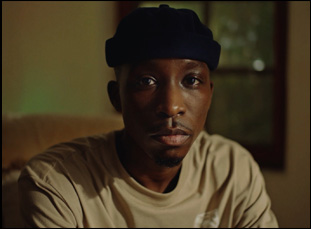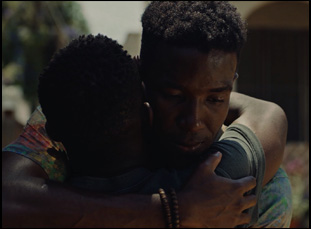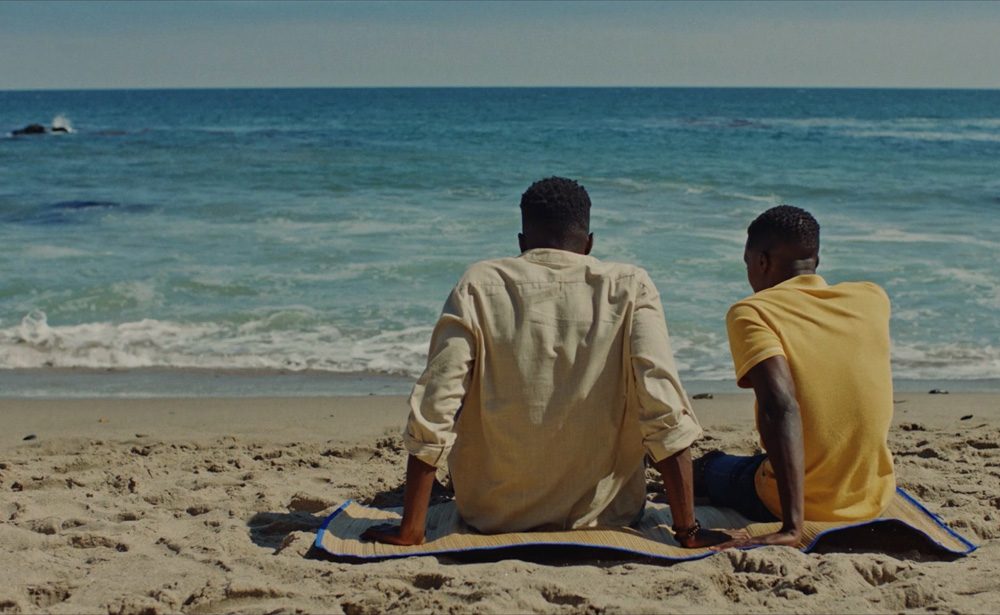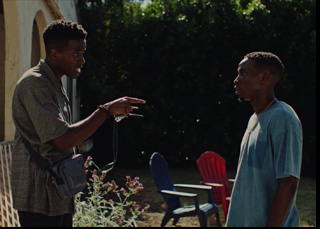“You know me, I only drink on the weekends,” Alhaji (Dillon Daniel Mutyaba) tells his brother Sheku (Omete Anassi) in “African Giants,” after the latter has arrived at his home in Los Angeles where the recycling bin is overflowing with beer bottles, but his roommates are out of town. Something seems off when the two see each other for the first time in a while, with Sheku keeping his head down across the country in law school while his brother, who goes by Elijah in Los Angeles, has pursued acting, but it appears that both pursuits are about to finally pay off when there’s a paid internship on the horizon that would be more money than Sheku has ever seen and Alhaji is on the verge of landing a leading role, knowing his agent and the project’s casting director are tight. Simply getting this far is an achievement for the brothers, whose parents migrated from Africa to America shortly after they were born with the hope of giving them a better life than they had, though these days the most vexing issues in both their lives may be not wanting to disappoint their father, a largely unseen presence in Omar S. Kamara’s captivating debut feature who nonetheless looms large over their every move.
Based in part on his own upbringing, Kamara sees both the comedy and the tenderness in the connection between the siblings who are trying to carve out their own identities while remaining connected to their roots, which is no easy task when both find themselves at odds with what their family wants for them. While Alhaji already has stopped speaking to their dad, Sheku has to wonder whether the same will come to pass with him when he’s contemplating giving up the law to join his brother and pursue the arts and as secrets mount up between them and their father, they start to accrue in their own relationship, unsure of what to share. It isn’t the first time Kamara has envisioned interfamilial conflict, conveying in his earlier short “Mass Ave” how a traffic stop by police drives a wedge in between a father and son who view it entirely differently based on their experience and age, yet with the broader canvas of a feature, the writer/director is afforded the time to show how expectations have governed their lives over the course of a weekend of mundane events together, playing hoops and going out to brunch with Alhaji’s girlfriend, who still hasn’t met much of his family after seven years, and reflect on what they owe to their ancestors as they consider breaking away.
With the lovely Los Angeles-set slice of life premiering this week at the Slamdance Film Festival, Kamara spoke about how his family came to accept his own choice to be a filmmaker, building a family atmosphere on set amongst his cast and crew and how they helped him overcome his nerves about shooting a major scene involving plenty of extras.
It all started with a quote from my mom that’s actually in the film, and when I was very young, she said, “Be careful how you behave. Your little brother’s watching, you’re his hero.” And I remember feeling a lot of pressure when she told me. I was like, “Nah. I’m trying to figure out my life and now here I am being like a hero for a person? That’s a lot going on.” And there’s a moment in the film where the older brother is in a less than ideal position and the little brother takes care of him, and I wish I could say that moment was not autobiographical, but it is. My little brother took care of me, and at that moment, I realized that even though my mom had said that my little brother was watching me and I was his hero, he could be my hero as well. He could be there for me and be inspiring and uplifting, so that was the basis of the film. Then I took other real conversations that my brother and I have had and sprinkled it within the film. It’s almost 95% autobiographical. I changed a little bit, but it’s very, very true to my life.
Both this and “Mass Ave” involve a disapproving father. If I’m not prying, can he see now that becoming a filmmaker might not have been such a bad thing?
Yeah, that is fantastic, and you never have to worry about asking me about my dad because I remember Peter Markham, who was the head of directing at AFI when I got accepted, told me in the interview, “Every filmmaker has one story they tell. They might tell it in different ways, but there’s like a story that they tell and your story is the story of you and your father.” And this is before I made “Mass Ave,” but somehow he knew this was the core of my being. So my dad is a very big factor in my life and in “Mass Ave,” you see him being disapproving and [there’s] a quote that is said in this film, which is, “If there’s one thing you know about me, it’s that I have a very strong will and if I never have to talk to you again, I never have to talk to you again.” My dad told me that when I said I wanted to be a filmmaker and it crushed me, but it built the resolve that this is what I do.
When he said it to me, it crushed me, but I [thought], “I’m still okay. If that’s the worst thing that happens, then maybe I can pursue this dream,” and I’m happy to report that my dad has done a complete 180 and is now probably the biggest supporter of my filmmaking career. I think the big thing for him was when I got into AFI, and he saw that this was a name that he could believe in, and he saw how hard I was working. When he saw “Mass Ave,” and it got licensed by HBO, he was like, “I see this.” So we have definitely come to terms, and he’s one of my best friends now. For most of my life, that was not necessarily the case, so I’m still speaking to the honesty of that moment and things that we’ve moved past, and I think we’ll always have these little nuances and little differences of opinion, so I wanted to put that in the film.

Yeah, those are probably the most important moments to me in the script. When I wrote them in the first draft they were actually called “Undisclosed Locations,” and in it, what I was just thinking was to just have a voiceover that speaks to these people’s lives and their upbringings that gives color, but it’s not directly related to the narrative. Both of my parents are great orators, and they give you a lot of quotes over time that you can use, so all the quotes are real quotes that either my mom said or my dad said that I put into the film and in terms of the visual [aspect] of it, that was definitely a collaboration. My production designer Mboni Maumba, and my [cinematographer] Jonas Fischer and my composer Justin [Schornstein] all came together to make that — Mboni had shown me a picture of a kitchen with a stainless steel reflection from the sunlight on it and I just thought it was one of the most gorgeous things ever, so I told her, what if we create a stained steel glass and reflect it on these characters as we do the voiceover and have them talk, looking at us? And our focus puller Nichole [Ruiz], did all those in one day, [which] takes extreme concentration to keep the focus as we pushed in. But that’s one of my favorite moments of the film because it speaks to the collaboration of me and my team, but also it’s something ethereal to me. It’s not necessarily right in the story. It’s the spiritual thing of these real quotes my parents said with the cinematography, with the voiceover by the actors and with their performance.
It’s really beautiful, and generally, the film is quite visually dynamic for something that’s just two guys in a room talking for much of it. Was it difficult to keep it lively aesthetically?
I think I would have been afraid if I actually thought about it, but I was so focused on making this film and just getting it done that it never even crossed my mind. Again, it was a collaboration between my [cinematographer] Jonas and my production designer [Mboni] about on how do we move the camera with [the actors]? If we sit them here, what’s going to be in the background that gives the viewer’s eye something to do? And my production designer said, “The apartment is a character in itself,” and it was a house that we completely moved the stuff out [that was there] and brought in everything that she handpicked, like the couch and [all the] greens, the textures that fills it out. It makes it more interesting. It makes it more dynamic. I was always aware that it is two people in an apartment, but sometimes I’m like in tunnel vision and I’m just going forward, so that’s how we made the film.
Omete was in “Mass Ave,” so you must’ve had him in mind, but how did Dillon come on board?
I love telling this story because my casting director Suzanne Yavuz, who’s wonderful, brought in Omete for “Mass Ave” and he played me, but in this case, he’s playing my brother and I actually wrote the film with him in mind. I told him, “Omete, pretty soon you’re going come back and we’re going to shoot this film.” And he always tells me that he thought I was joking. But I called him, and he’s one of the first people who got the script. He actually applied to Juilliard on the set of “Mass Ave,” and he got in, so [we ended up] shooting this in between his second and third year.
What I didn’t know is when I was casting Dillon Daniel Mutiaba, who plays the older brother, I fell in love with him, but unbeknownst to me, he had just gotten into Juilliard and he was assigned as Omete’s little brother at Juilliard, his mentor at Juilliard between the third year and the first year, so they [already] had met once, but this film brought us all together. And I hate to be super hokey, but I do think that there’s a spiritual thing that happens with films. It’s this ethereal thing that when all the elements come together, they’re super and the fact that [Omete and Dillon] had a relationship, I think they were supposed to do this together and our bond has been very deep since then. We actually have a group chat called “African Giants,” where it’s just us three and they gave everything to me. They are people I hope to work with more in my future projects, but I’m very grateful for their performances. This film lives and dies with them.

Absolutely. One thing I learned at AFI is that all directing happens in pre-production. My mentor, Rob Sparrow told me that if you’re a director on set, everyone should know what the vision is and you’re just constantly reminding people because you’ve done all that work in pre-production, so we did rehearsals, but I actually stole something from Asghar Farhadi where I don’t do rehearsals based off the script, but instead based off building a lived experience. For example, there’s a moment in the film where they talk about how the older brother and his girlfriend broke up and we rented a room and we just did a bunch of scenarios [around] “Hey, this is the day your brother broke up with his girlfriend, you’re worried about him, come to his house and check on him.” And I just let them go for 20 minutes. They would just go and improv and be in this shared experience and created a backstory basically they can call upon when they’re filming. It was phenomenal, and what I learned is when you have talented actors and you set up the pre-production very well, everything they bring is usually better. So these guys would bring little nuances or add a line or say something a little bit different [where] I’m like, that’s better than how I wrote it. The beautiful thing is building this trust in a relationship where you believe in each other, so that way you’re not afraid to try things.
You have this big party in the movie after spending much of it alone with these two brothers. What was that like?
This is great because now I can tell you a moment where I was scared. We actually shot everything pretty much in order except for the exterior locations. We shot the first scene in the house on the first day and kept going throughout like that, and I thought it’ll build their relationship. If they’re a little nervous, it’s okay because they’re just seeing each other for the first time again and it was this beautiful symbiotic bond where we just [got to] know each other. And before we had the party scene, we did the scene where they were in the bedroom with four or five other actors, and on my short, I had a scene with five people, but for some reason it felt different to me. I don’t know why. And the day we were about to shoot that scene, I literally went to my DP and I was like, “Are we doing this right? There’s four actors, we need to cover all of them. How do we make sure?” And my DP yelled at us, “Calm down, we’ve shot listed it, we’ve blocked it, we know exactly what we’re doing, don’t stress.” But I was nervous because I had never directed that many actors, so it was a lot.
So that was the first time I was scared, and it was in the second week [of production], and then when the background [actors] came in, I want to shout out my first AD Ryan Pratt because we lost half of our background, like on that day, so it’s actually a certain amount of people that we have coming back and forth, and we had this pattern of how we’re going to have them walk. My cousin is one of them, and some crew is in that shot, but we literally were finding a way to be creative and get it done. And I was weirdly more scared for that [scene with the five actors] in the room beforehand than I was for the party scene because when you have a great team, they can help instill confidence in you.
What’s it like having your first feature under your belt?
I’m still pinching myself. It is the culmination of a dream come true and actually I had the poster made last week, and when I looked at it – because I saw it like on the IMDb page [next to] the posters of “Moonlight” and “Whiplash,” all these people that I looked up to and loved on that IMDb page, and it’s just a random morning, I’m sitting there and I see the poster on that page, and I just started crying. And I started crying because I had been working at this for so long. I’ve been wanting to make a feature film for so long, and to actually be at the point where I’m on IMDb and people can look at that, and we’re gonna be screening at Slamdance where Bong Joon-ho premiered his first feature. I feel on top of the world. I think in my [social media] post I wrote, “I feel like an African giant myself,” so I’m thrilled, I’m honored, and I can’t wait to be at the world premiere.
“African Giants” will screen again at Slamdance on January 23rd at 2:30 pm at the Summer and David Theater at the Yarrow Hotel in Park City. It will also be available to stream on the Slamdance Channel from January 22nd through 28th.





